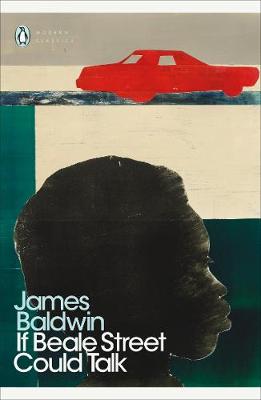I was lucky enough to see an early screening of Barry Jenkins' film 'Moonlight' at the London Film Festival back in 2016. It was one of my favourite films of that year and I was thrilled that it won the Oscar for Best Picture a few months later – after Warren Beatty finally opened the right envelope! Jenkins new film is an adaptation of James Baldwin's “If Beale Street Could Talk” and I'm really looking forward to seeing it. But I always try to read a book before seeing the film version and I've been meaning to read more of Baldwin's writing for a long time. In college I read “Go Tell It on the Mountain”, “Giovanni's Room” and “Another Country” but I've not read anything since then. Somehow I forgot how forthright and emotional Baldwin's fiction is because I think this novel is absolutely extraordinary.
“If Beale Street Could Talk” is narrated by nineteen year old Tish who has become pregnant by her fiancé Fonny who she's been close to most of her life. They've found their own place to live in Harlem and received a blessing from Tish's father to marry, but their plans collapse when Fonny is falsely accused of rape and imprisoned. Both their families try to pull together to get Fonny out of this dire situation, but they encounter many obstacles due to economic disadvantages and institutionalised racism. It's a heart-wrenching tale, but powerfully describes the bonds of family and romantic love in the most exquisitely beautiful way.
Baldwin has a way of articulating in clear-sighted lucid prose his intense frustrations on a number of subjects. There are frequent cutting asides like this which slaps down the inflated egotism of a nation's spirit: “I must say that I don’t think America is God’s gift to anybody - if it is, God’s days have got to be numbered.” Another line feels so contemporary it's like Baldwin was critiquing the self righteous indignation of people on social media: “these days, of course, everybody knows everything, that’s why so many people, especially most white people, are so lost.” Passages like this burn with the intensity of sparks. Baldwin was a great essay writer and speech maker and maybe this comes through too strongly in a narrative meant to be narrated by a nineteen year old. Equally some later sections stray so far into other characters' points of view I wonder why he kept the entire novel in Tish's first person voice. Nevertheless, the dialogue and relationships between the characters in this novel felt entirely true.
There's also a startling edginess to Baldwin's writing in how he portrays sexuality and frank heated exchanges. An early sex scene between a husband and his zealously religious wife is shown with surprising violence and expresses the unvoiced conflicts in their relationship. This contrasts so sharply with the mountainous passion expressed when Tish and Fonny make love. I was riveted by the arguments between the families which built to such a riotous show down it could have been a confrontation portrayed in a daytime talk show. It's also somewhat bracing to read how some racist and homophobic language is used by the characters. This makes total sense because it's of the era but you know that phrases such as “eyes like a Chinaman” and “the way his behind stuck out, his mother might have been a gorilla” wouldn't fly in a novel written today.
Scenes of furious confrontation are balanced with touching moments of forgiveness and some scenes subvert your expectations such as when disenfranchised members of a community come together when Tish gets groped at a grocers. But alongside the high drama there are also many quiet moments of reflection that reveal the depths of great psychological complexity. For instance when considering her appearance Tish observes “People make you pay for the way you look, which is also the way you think you look, and what time writes in a human face is the record of that collision.” This is such a disarming way of considering how our image of ourselves and judgements by others about our appearance can mingle.
What comes across most of all is how many of the issues Baldwin was writing about almost fifty years ago (this novel was first published in 1974) still feel relevant today. Perhaps that's why Barry Jenkins is bringing this story to the big screen now. I'm looking forward to watching it as well as Jenkins' next project which is turning Colson Whitehead's “The Underground Railroad” into a mini series.









